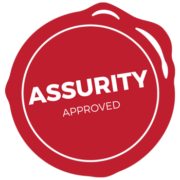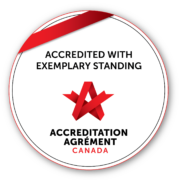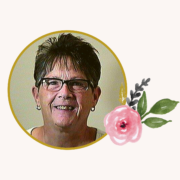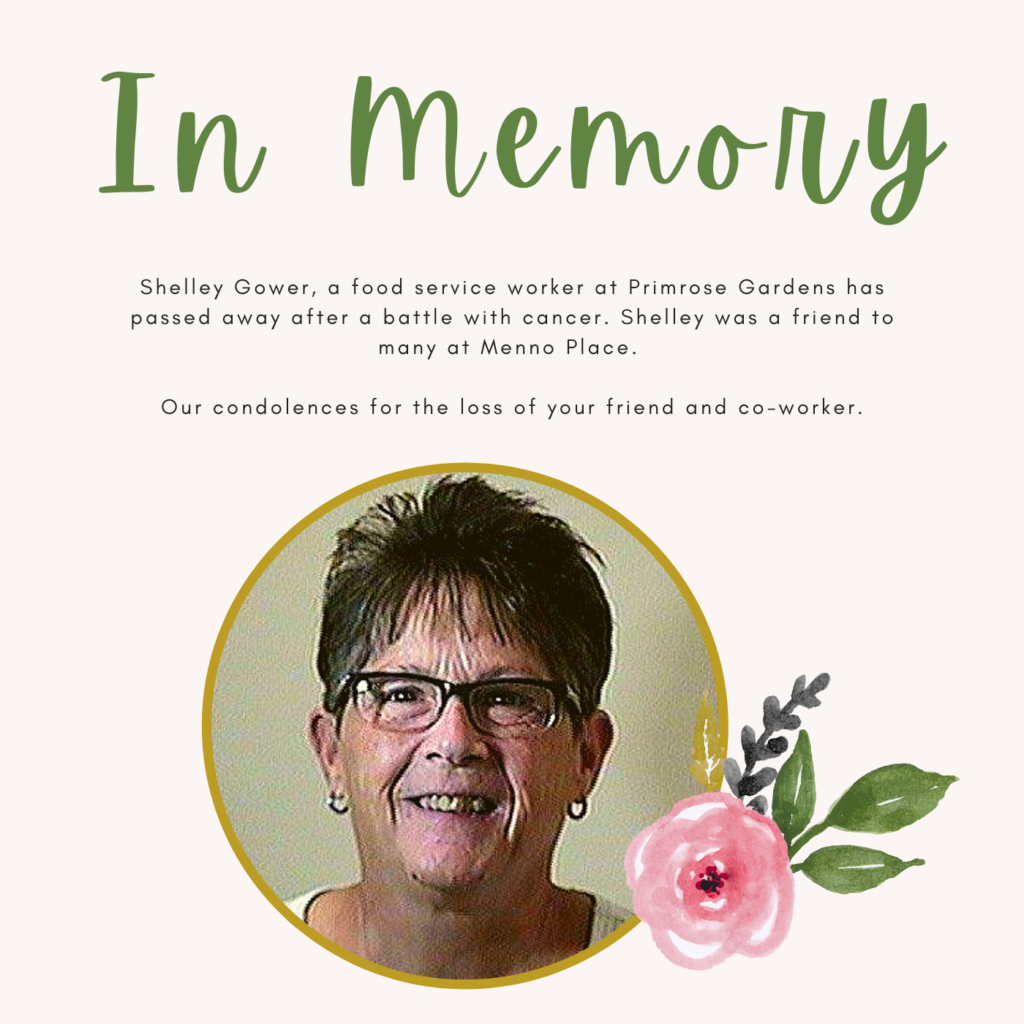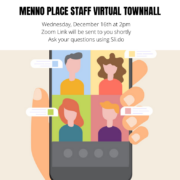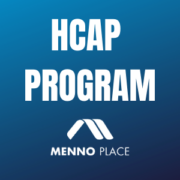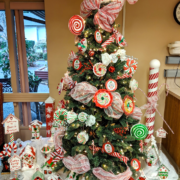DECEMBER 24 – DAILY UPDATE – MENNO HOME E2, W1 & THE APARTMENTS
/in NewsWe are sad to share with you that the 41st resident in Menno Home E2 has contracted COVID-19.
COVID POSITIVE UPDATE – December 24 – 2020 – Menno Place
MENNO HOME E2 – 1 new COVID positive resident (T=64)
MENNO HOME W1 – No change to COVID positive staff or residents (T=2- 1 resident, 1 staff | 1 resident has passed away)
PAVILION – No change to COVID positive residents T=3 (3 residents |0 staff 1 resident has passed away)
All residents were swabbed for COVID yesterday. Thank you to all for your cooperation.
Please ensure that you share the test results with Cheryl.Dawes@MennoPlace.ca| 604.851.4020 | Cheryl Dawes is the Manager of Community Enrichment for The Apartments
ALL RESIDENTS IN PAVILION ON ISOLATION AS PER MEDICAL HEALTH OFFICER ORDERS
PRIMROSE GARDENS – COVID-free. 3 residents on isolation. 8 removed from isolation. The isolation date is calculated from the time of exposure (Dec. 5th), although we were not notified by Fraser Health Home Health that there was an exposure to COVID positive. As soon as we became aware, we put residents on isolation.
TERRACE WEST – COVID-free. No residents on isolation. Dining room will be closed as all apartment buildings are cohorted. This means that no residents or staff are travelling between buildings in order to prevent COVID transmission. Terrace West residents cannot cross into Terrace East for meals or to the hair salon.
TERRACE EAST – COVID-free.
How to Walk on Ice – Be Safe
/in News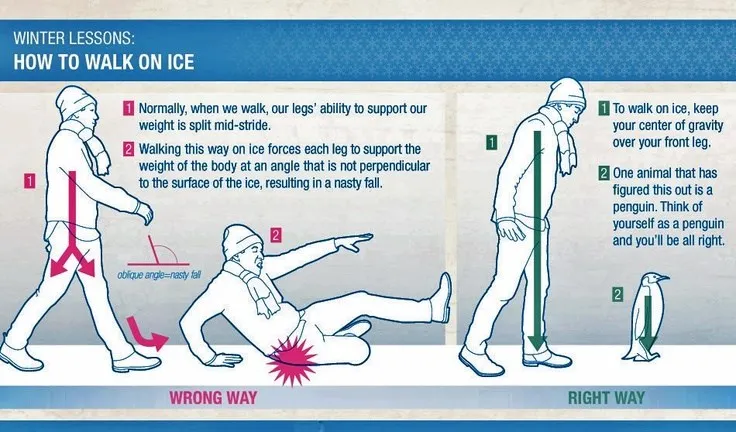
- Keep your weight forward and on your front foot
- Keep your arms out by your side to help you balance
- Walk flat footed and take short shuffling steps
- Wear footwear that provides traction
- Step down, not out from curbs
- Keeps your knees slightly bent
- Walk on snow or grass if possible
REMINDER – EVERY UNIT HAS IT’S OWN ENTRANCE AND EXIT
/in NewsThis is a reminder that every unit in Menno Home and Menno Hospital has its own entrance and exit. It is difficult to break habits when you are accustomed to entering a certain way to go to your work place.
If you are unsure of where to enter your unit, please ask your supervisor. For example – staff who work in W2 Home may be accustomed to entering via the W1 entrance and going up the elevator. This is no longer the W2 staff entrance. You must enter W2 by the W2 door on the south end of the campus (with the ramp).
Cohorting staff to one unit is one of the key ways that we prevent the transmission of COVID from one unit to the next.
Virtual Townhall – Menno Place Staff – Watch the Recorded Townhall
/in NewsWatch the Virtual Menno Place Staff Townhall – Recorded Wednesday, December 16, 2020 at 2pm
Pandemic Pay – Update – Dec. 15, 2020
/in NewsPandemic Pay Update – December 15, 2020
The Pandemic Pay was paid to the Menno Hospital employees today. We are grateful for the work of Kathrin McMath and the Finance team to make this happen so quickly after receiving the funds. The Province of BC apologizes for the significant impact this delay has had for everyone affected – “Despite the challenges of the program, it should not have taken this long for eligible employees to receive their pay.”
We are hoping that Menno Home and Apartments will receive their pandemic pay shortly.
Unfortunately, we do not have a date for the Home and Apartments pandemic pay. Each organization is processed individually. The Government is anticipating that all claims will be complete by the end of January 2021. They recognize that this prevents employees from receiving much-needed funds in time for the holiday season during the COVID-19 pandemic.
We did receive communication about why the Pandemic Pay is so late:
Delays are largely due to administrative complexities associated with distributing a new program to an estimated 250,000 employees across the province, working for hundreds of different employers.
- Payments continue to be distributed regularly as claims are processed.
- We expect to complete nearly all claims by the end of January 2021.
- Moving forward, we will be working closely with employers and lead unions to ensure the concerns they are receiving from frontline employees regarding the program are heard and addressed.
Respiratory Protection for Health Care Workers in Long Term Care
/in NewsRespiratory Protection for Health Care Workers in Long Term Care
The past 4 weeks have been a very challenging time for all of the health care workers on the Menno Place campus as both Home and Hospital were on full droplet precautions, requiring full PPE. There is no time in recent history that long-term care healthcare workers have been required to use PPE to this extent – it is new to all of us.
The spread of COVID among the staff in Menno Home E2 has highlighted questions about PPE, including whether or not we are protected when we wear the PPE we’ve been issued. Some have asked if we should be issued N95 masks for better protection when working on a COVID-positive unit.
Recently, an ICU specialist from St. Paul’s Hospital met with the Fraser Health Medical Directors for Long Term Care and shared that he is wearing a regular surgical mask and shield for his routine work in ICU where he consistently works with COVID-19 positive patients. This was brought to us by Dr. Dueck, our Medical Director, as we discussed the protection provided to healthcare workers with the regular surgical mask. ICU doctors and nurses only wear an N95 when a patient is ventilated and particles are aerosolized.
Although there is no harm in wearing a medical grade fitted N95 mask that is issued to you, there is no additional benefit, either, as we do not do these procedures in long-term care. Using a non-medical grade or unfitted N95 mask does pose a risk as it will not function as required for this environment and may result in greater risk to the wearer and provide less protection than the use of a surgical mask.
Available data indicates that COVID-19 spreads more like a common respiratory virus, primarily through respiratory droplet transmission within a short range (eg. Less than six feet). There is no evidence of efficient spread (ie: routine, rapid spread) to people far away or who enter a space hours after an infectious person was there. Surgical masks (the blue medical grade ones) are effective barriers for retaining large droplets which can be released from the wearer through talking, coughing, singing or sneezing. They protect the wearer from sprays, splashes and droplets. The contaminated N95 mask brings with it all the same opportunities for risk of contamination, particularly in doffing the mask after being in the presence of a COVID positive resident.
In the COVID positive unit, we have gone with the extended use of masks and goggles to decrease the numbers of times that PPE is changed and minimize the risk of contamination. We have increased our education and audits to promote personal and team confidence in effective use of PPE, enhanced cleaning, respiratory etiquette, donning and doffing and hand hygiene. We have practiced and supported each other with the help of two educators, Lada and Mike (Fraser Health). This encouragement and training has brought confidence and resulted in the slowing of the spread of the virus. This is the power of team working together! These are the infection control practices that, combined with proven PPE are effectively stopping the spread of COVID in Menno Home E2.
Sources of information:
https://www.ccohs.ca/oshanswers/prevention/respiratory_protection.html
https://www.cdc.gov/coronavirus/2019-ncov/more/scientific-brief-sars-cov-2.html
Dr. Dueck, Medical Director, Menno Home and Hospital
Sign Up for Vaccination – COVID-19 mRNA vaccine
/in NewsSign up for the COVID-19 Vaccination as early as tomorrow.
MEMO: New Position at Menno Place: Health Care Support Worker
/in NewsMEMO
Date: December 15, 2020
To: All Menno Place Team Members
Re: New Position at Menno Place: Health Care Support Worker
Menno Place is pleased to announce that we have been approved for 18 Health Care Support Worker (HCSW) full time positions fully funded by the Government of British Columbia’s Health Career Access Program (HCAP). This program was developed in response to the urgent staffing needs across long-term care and assisted living sectors in BC.
Menno Place has received approval for 8 candidates for Menno Home, 6 candidates for Menno Hospital and 4 candidates for Menno Apartments – Assisted Living.
The HCAP program works like a co-op – successful candidates work at the site and go to school for the HCA program at the same time. This is a temporary position when, once completed, the person graduates with their HCA certification.
The HCAP education and training program will take approximately 12-18 months to complete. Start date to be determined early 2021. It provides an opportunity for individuals to receive paid employer-sponsored training leading to a HCA credential. The candidate must make a 12 month commitment to the employer to work as a HCA at the site once they have graduated from the program.
Jeanette Lee
Director, Human Resources
Menno Place
USE OF MATERIALS
All materials available on the www.MennoPlaceStaff.com website are published for the sole purpose of keeping informed those individuals who work on the Menno Place campus. These materials may be shared with others who are also connected to the Menno Place campus in this same way. No content or material may be used or shared in any other context without the written permission of the Menno Place Director who oversees communications.
